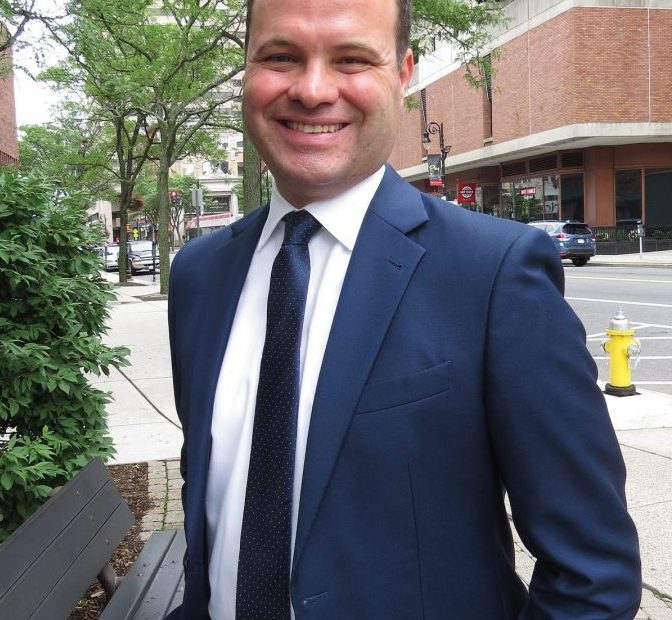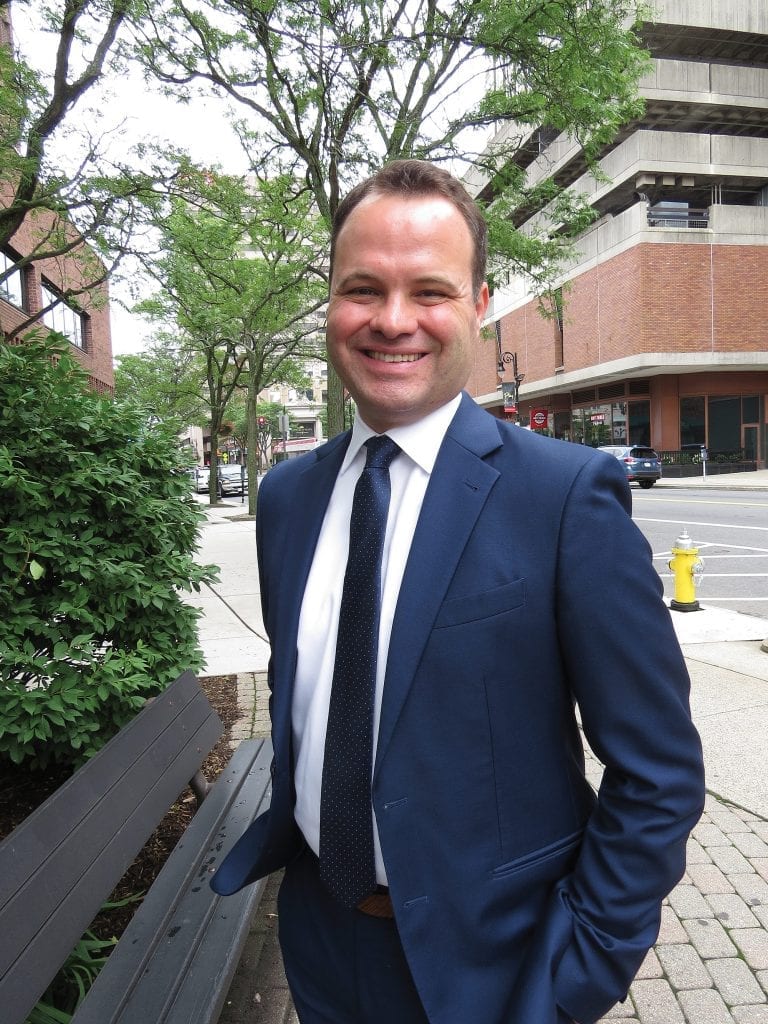
Eric Lesser
State Senator, First Hampden and Hampshire District

Eric Lesser
Eric Lesser says he doesn’t know if a proposed high-speed rail project linking the eastern and western parts of the state has enough support on Beacon Hill to become reality.
What he does know is that the concept has never been this close to becoming reality, and he isn’t shy about touting his role in getting what has become known as ‘east-west rail’ as far down the tracks as it has ever traveled.
“We’re at a closer and more exciting moment than we’ve ever been,” he said of the initiative. “With Joe Biden in office, with the feasibility study done … after eight years of advocacy and work, we have the best chance we’ve ever had of making this reality.”
The rail proposal is just one of the initiatives Lesser has led since first being elected to the First Hampden and Hampshire District Senate seat in 2014 (and earning a 40 Under Forty nod the following year). Most, but not all, of them have fallen into the broad realm of economic development and, more specifically, into the area of leveling the playing field between east and west within the Commonwealth and bringing opportunities to the people — and communities — of the four western counties.
“The animating principle of both my campaign in 2014 and, really, every day I’ve been in office since then has been unlocking and creating economic opportunity for Western Mass. that’s comparable and equal to people in Eastern Mass.,” said Lesser, a first-time finalist for the Alumni Achievement Award. “I will have succeeded if a child born in Springfield or Chicopee or anywhere in Western Mass. has the same shot at making a good living and supporting a family as a kid born in the Boston area.”
By now, most know the story of how Lesser, then 29, moved to the State House from the White House, specifically a position in the Obama administration as a special assistant to Senior Advisor David Axelrod. Lesser, who has a bachelor’s degree in government from Harvard and a juris doctor from Harvard Law School, started his career as an aide on Obama’s 2008 presidential campaign.
Today, he holds several leadership positions in the Legislature. He is Senate chair of the Joint Committee on Economic Development and Emerging Technologies, Senate vice chair of the Joint Committee on Financial Services, Senate vice chair of the Joint Committee on Transportation, and Senate chair of the Joint Legislative Manufacturing Caucus, the Gateway Cities Caucus, and the Libraries Caucus.
Recent initiatives have included a number of efforts to bolster the state’s manufacturing sector and raise awareness of the 10,000 vacant manufacturing jobs in the four western counties, including work to create apprenticeship tax credits and fund mid-career training programs for workers. Lesser has also been at the forefront of efforts to create the Student Loan Borrower Bill of Rights, which recently became law in the Commonwealth.
As for those efforts to level the playing field between east and west, they come in a number of forms, said Lesser, who started by referencing the Clinical Trials unit at Baystate Health, which will open in the fall, part of the Life Sciences Bill passed several years ago. It will create jobs, but also enable people in this part of the state to take part in clinical trials without having to travel to Boston.
He also cited his efforts to lead an initiative to encourage more people to relocate to Western Mass. through a remote-worker incentive, which would pay workers up to $10,000 to move to this region, a concept that, given the lessons provided by the pandemic about where people can work and how, proved to be ahead of its time.
And then, there’s east-west rail.
“Frankly, I got laughed out of a lot of rooms when I talked about connecting Springfield and Boston by train service,” he told BusinessWest. “People said it would never happen; they said it was something we shouldn’t focus on. But now, our chances are as good as they’ve ever been, and the next year will provide the answer. We need to get the federal money secured, and we’re closer than we’ve been to seeing that happen.
“A major unfinished piece is the governor supporting it from there,” he went on. “That’s a major piece that requires our focus and our attention. An eyelash isn’t batted about investments in Boston, but when an investment will help the whole state … suddenly there’s a lot of questions about how expensive it will be.”
Lesser’s latest assignment is as co-chair of the new Future of Work Commission, which will include 17 members from across the state who will address a topic that was already dominated by question marks before the pandemic.
“These are some of the biggest questions in society right now,” he said. “How are people going to work in an era of remote working? How are benefits going to work? How is commuting going to work? What does transportation look like when people are no longer in 9-to-5, in-an-office-building jobs? How is automation going to be impacting society? These are some of the biggest questions we have, and this commission will look to answer them.”
Summing up his first seven years in the Legislature, Lesser said this time has been a learning experience, and what he’s learned is that change and progress come through patience and diligence.
“Success in politics is about methodical, persistent progress,” he explained. “Sometimes it’s two steps forward, one step back; sometimes it’s two steps forward, three steps back. But staying focused on the ultimate goals and working collaboratively with people is the key. One of the things I’ve seen seven years in is that some of the seeds we’ve planted back in 2015, 2016, and 2017 are now blooming.”
By keeping that focus and working collaboratively, Lesser has certainly seen many of his initiatives bear fruit, which helps explain why he is a finalist for the coveted Alumni Achievement Award.
—George O’Brien





